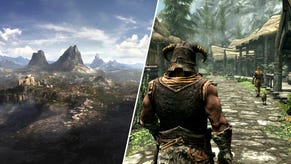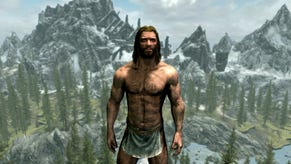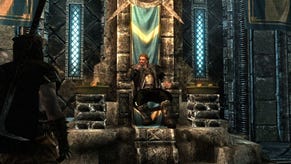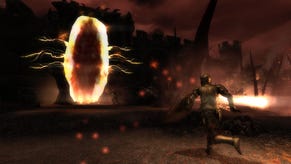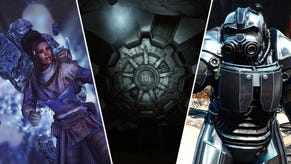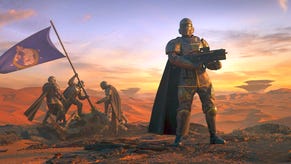Flying high: Skyrim aims to redefine the open-world RPG
The next Elder Scrolls game is everything we'd hoped for – based on the evidence of the E3 demo, anyway. Click to find out why it was one of our games of the show.
Our E3 Skyrim demo begins standing at the foot of a craggy, frosty mountain the juts up into a grey sky, disappearing into ashen clouds. This being an Elder Scrolls game, you just know you're going to end up climbing it to see what's at the top – even if what's at the top, be it tomb, sanctuary, ancient monument or reclusive creature, is extremely likely to kill you.
Skyrim's close now – it's coming out in November, in the same window as about five other enormous games that I desperately want to play. But this tops the list. It's a slicker, more visually interesting Elder Scrolls game, one that seems to have no shortage of memorable moments.
Combat – with sword, shield, bow and arrow, magic, mace, axe or whatever else you can find – is still a first-person affair, but the addition of finishing moves and kill-cam makes it feel a bit less sterile. You wield magic in your hands, Bioshock-style, with energy fizzing and crackling around your flexing fingers. Equipping the same spell in both hands lets you cast it with twice the power. There's a familiar sneak mechanism, which thief-like character builds will rely upon for damage bonuses.
As in every Elder Scrolls game, you learn by doing, levelling up your skills passively. Get hit and your armour skill improves; smash things with a mace to become a master bludgeoner; each of the four magic disciplines has its own stat that improves as you practice. The level-up messages and pause screen fonts are clean, simple and modern, not unnecessarily ornate. The interface in general is efficient and clear – a huge improvement on the massive stat lists and unintelligible that have always weighed Bethesda games down.
Climb time
But anyway. Back to that mountain. After working our way through a village, taking in the sights, we end up at the bottom of the mountain path. It's hear the we learn that Skyrim involves at least one horse, which according to the Keza MacDonald Horse Metric means that it's basically bound to be a world-changer.
The weather changes as you ride further up the mountain thanks to Skyrim's dynamic weather system. Snow starts falling as you climb, turning into a blizzard the further up you get. Switching out into third-person, the animation's nowhere near as awkward as it was in Oblivion, though the character models still don't look quite at home in their world. Facial animation during conversations is, disappointingly, still a bit wooden and wonky.
The horse walks convincingly along mountain paths, and the armoured character doesn't noticeably skate over the ground as he walks, but it's not the tactile, grounded movement of a Nathan Drake or a Lara Croft. Given that this is a game designed to be played in first-person, though, it's a minor shortcoming that will hopefully be easy to forgive.
About halfway up the mountain, we come across a dungeon. I'll spare you the details of the ensuing quest for fear of spoiling the the game, but the dungeon is stylistically very similar to many of Oblivion's. It's underground, dank, cold, constructed of winding torch-lit tunnels and blueish, ethereal caverns. It's menacing, and atmospheric.
Loot porn
It's been a long time since I've gotten excited about an inventory, but Skyrim revitalises that, too. Instead of a huge long list of items in a journal or electronic device – a la Oblivion, Fallout and most other developers' huge RPGs, too – you have a clean, clear interface accessed via the Start menu, all columns of clear grey background and white text. It's divided neatly into magic, books, weapons, armour and so forth.
Every item in the inventory comes with a fully rendered 3D image, displayed to the right of its written entry above its vital statistics – what it's called, even who made it. Press a button and you can rotate that 3D model, examining your loot from every conceivable angle. It's loot pornography.
Here be dragons
Out the other side of the dungeons, the snowstorm thickens as we near the mountain's summit. The distant beating of might wings confirms what we knew was coming: a dragon. The beast is enormous, landing on the earth with a tremendous, crashing thump and breathing fire in our demonstrator's general direction. He flees, and the scene changes – we're back on level ground, following a herd of mammoths across a plain.
Unfortunately, it turns out that mammoths are dragon bait. The great beast returns, scooping up one of the enormous mammals in its claws before coming back to burn us to a crisp. It circles in the air, flapping those enormous wings; guards and townsmen from a nearby city join the fight to bring it down.
Here, we're shown a hell of an impressive spell – one that darkens the skies, summoning storms and lightning to strike the lizard out of the sky. It crash-lands, shaking the earth; our demo ends as the demonstrator finally vanquishes it, absorbing its soul.
Skyrim could be the game to fulfil the full potential of the open-world fantasy RPG
Skyrim isn't conceptually or thematically all that different from Oblivion – but mechanically and aesthetically it's a big step forward. We couldn't see it in the demo, but Bethesda claims a change in tone, too – closer to the darker, socio-political material of Morrowind than its successors rather bland plotting and characterisation, which stood in stark contrast to the richly well-crafted nature of the world and its mythology.
Skyrim fulfils that Elder Scrolls mythology – the return of the dragons has been written into these games since the beginning. It could also be the game to fulfil the full potential of the open-world fantasy RPG, now that Bethesda has learned its current-generation development lessons through Oblivion and Fallout 3 . It's not the conceptual leap that Morrowind was, nor the technical innovation that Oblivion was, but it's nonetheless the most ambitious game in this ceaselessly ambitious series.
I'm going to have to take a week off in November. I'm sure I won't be the only one.
Skyrim releases on November 11 for PC, PS3 and 360.







